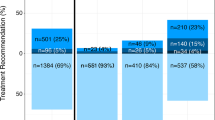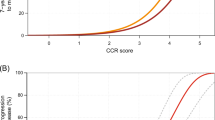Abstract
Background
Multiple genomic tests are available following radical prostatectomy (RP), however, there is a lack of head-to-head evidence for these tests. We sought to compare the performance of two genomic tests in predicting post-RP oncological outcomes.
Methods
A cohort of 16 post-RP patients with adverse pathological features who had obtained both Decipher (D) and Prolaris (P) testing. The Pearson correlation was used to compare scores from D and cell cycle progression (CCP) from P. Then, we derived a microarray CCP (mCCP) from D and correlated with P-CCP. The associations of D and mCCP with biochemical recurrence (BCR) and metastasis (M) was evaluated in multivariable survival analysis (MVA) in a large cohort of RP patients treated at Johns Hopkins University (1992–2010). In addition, we characterized the expression of the 31 P-CCP genes and mCCP scores in a cohort of 17,967 RP samples from Decipher platform.
Results
There was significant correlation between the D score and P-CCP (r = 0.67, p = 0.004), and between the 10-year probability of BCR reported by P and 5-year probability of M reported by D (r = 0.69, p = 0.003). In this cohort, mCCP derived from the D platform was highly correlated to the reported P-CCP scores from the P platform (r = 0.88, p = 6.7e−6). In a comparative retrospective RP cohort, both mCCP and D were significantly associated with M outcome (p < 0.01 for both). On MVA, D was a predictor of M (HR 1.3, 95% CI [1.12–1.52], p = 0.0005), while mCCP was not a predictor of M (p = 0.62). In the D platform cohort, the 31 P-CCP genes were correlated to each other, and TOP2A was the most correlated to mCCP (r = 0.7).
Conclusions
We found that P and D scores post-RP were correlated and help in identifying patients who at high risk of BCR in this cohort. In a larger cohort with longer follow-up, D was predictor of M, whereas mCCP was not.
This is a preview of subscription content, access via your institution
Access options
Subscribe to this journal
Receive 4 print issues and online access
$259.00 per year
only $64.75 per issue
Buy this article
- Purchase on Springer Link
- Instant access to full article PDF
Prices may be subject to local taxes which are calculated during checkout

Similar content being viewed by others
References
Kornberg Z, Cooperberg MR, Spratt DE, Feng FY. Genomic biomarkers in prostate cancer. Transl Androl Urol. 2018;7:459–71.
Loeb S, Ross AE. Genomic testing for localized prostate cancer: where do we go from here? Curr Opin Urol. 2017;27:495–9.
Spratt DE, Yousefi K, Deheshi S, Ross AE, Den RB, Schaeffer EM, et al. Individual patient-level meta-analysis of the performance of the decipher genomic classifier in high-risk men after prostatectomy to predict development of metastatic disease. J Clin Oncol. 2017;35:1991–8.
Mohler JL, Antonarakis ES, Armstrong AJ, D’Amico AV, Davis BJ, Dorff T, et al. Prostate cancer, version 2.2019, NCCN clinical practice guidelines in oncology. J Natl Compr Cancer Netw. 2019;17:479–505.
Zhao SG, Chang SL, Spratt DE, Erho N, Yu M, Ashab HA, et al. Development and validation of a 24-gene predictor of response to postoperative radiotherapy in prostate cancer: a matched, retrospective analysis. Lancet Oncol. 2016;17:1612–20.
Tomlins SA, Alshalalfa M, Davicioni E, Erho N, Yousefi K, Zhao S, et al. Characterization of 1577 primary prostate cancers reveals novel biological and clinicopathologic insights into molecular subtypes. Eur Urol. 2015;68:555–67.
Sommariva S, Tarricone R, Lazzeri M, Ricciardi W, Montorsi F. Prognostic value of the cell cycle progression score in patients with prostate cancer: a systematic review and meta-analysis. Eur Urol. 2016;69:107–15. https://doi.org/10.1016/j.eururo.2014.11.038.
Cuzick J, Swanson GP, Fisher G, Brothman AR, Berney DM, Reid JE, et al. Prognostic value of an RNA expression signature derived from cell cycle proliferation genes in patients with prostate cancer: a retrospective study. Lancet Oncol. 2011;12:245–55.
Alshalalfa M, Liu Y, Wyatt AW, Gibb EA, Tsai HK, Erho N, et al. Characterization of transcriptomic signature of primary prostate cancer analogous to prostatic small cell neuroendocrine carcinoma. Int J Cancer. 2019;145:3453–61. https://doi.org/10.1002/ijc.32430.
Ross AE, Johnson MH, Yousefi K, Davicioni E, Netto GJ, Marchionni L, et al. Tissue-based genomics augments post-prostatectomy risk stratification in a natural history cohort of intermediate- and high-risk men. Eur Urol. 2016;69:157–65.
Acknowledgements
We thank Tamara Lotan from JHU for sharing outcome data for patients in the JHU cohort. We thank GenomeDx for sharing Decipher GRID™ data.
Author information
Authors and Affiliations
Corresponding author
Ethics declarations
Conflict of interest
The authors declare that they have no conflict of interest.
Additional information
Publisher’s note Springer Nature remains neutral with regard to jurisdictional claims in published maps and institutional affiliations.
Supplementary information
Rights and permissions
About this article
Cite this article
Shahait, M., Alshalalfa, M., Nguyen, P.L. et al. Correlative analysis between two commercially available post-prostatectomy genomic tests. Prostate Cancer Prostatic Dis 24, 575–577 (2021). https://doi.org/10.1038/s41391-020-00305-0
Received:
Revised:
Accepted:
Published:
Issue Date:
DOI: https://doi.org/10.1038/s41391-020-00305-0



